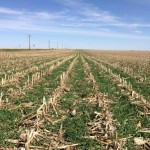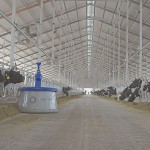Promoting on-farm climate resilience
Healthier soil means better water retention
Added 3 years ago

Why is this photo taken 3 February 2022 in Hawke’s Bay significant?
All of the most authoritative science sources – from NASA and NOAA in the US to the European Union’s Copernicus Climate Change Service have confirmed that 2021 was the fifth hottest year on record, making the last eight years together the hottest on record.
NZ falls squarely in this pattern. Resilience to climate change must become part of the planning of every farmer and grower in Hawke’s Bay.
The photo clearly illustrates, on two sides of a boundary fence, the results right now in HB from two different farming approaches – conventional versus regenerative. Need we say which is healthier?
Building soils that retain more water is key to resilience.
And while often climate change is seen primarily in terms of water security, water is just one of many changing factors affecting what HB produces … where … and how successfully. Climate change will alter the number of days of extreme heat, diurnal temperature differences, blooming and ripening schedules, frosts, potentially new pests and plant disease.
And these ‘natural’ changes will be accompanied by policy directives aimed at reducing NZ greenhouse gases, with the primary sector expected to play a significant part.
As a key priority, the Trust will be looking to identify and promote farming practices in HB that support greater resilience to climate change.
Join the conversation
Be the first to leave a comment.
Leave a comment
All comments are reviewed before they are published on the website. Your email address will not be published.






